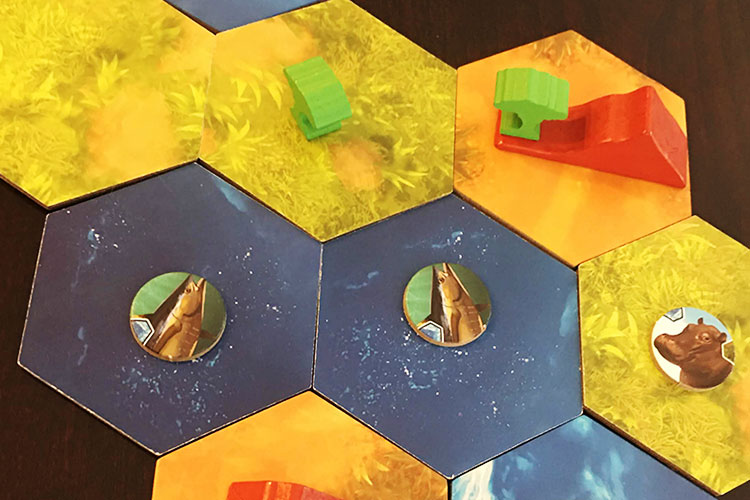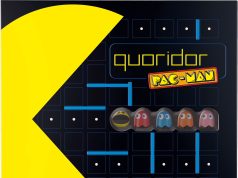 Civilization-building games have their roots dug deep into board gaming history, with Civilization being one of the first (obviously). Since then, there have been a multitude of titles giving players the experience of watching their civilization grow from a nascent group of individuals to a global superpower. In our estimation, there have not been too many titles that give you the ability to develop the actual planet itself, in a time long before man walked the earth.
Civilization-building games have their roots dug deep into board gaming history, with Civilization being one of the first (obviously). Since then, there have been a multitude of titles giving players the experience of watching their civilization grow from a nascent group of individuals to a global superpower. In our estimation, there have not been too many titles that give you the ability to develop the actual planet itself, in a time long before man walked the earth.
In Ecos: First Continent, you have the ability to shape the land and ecosystem to your exacting specifications, but unlike putting in an order for a custom planet at Magrathea, you do not need to be one of the galaxy’s richest people.
Gameplay Overview:
In Ecos, you take on the role of a “force of nature,” attempting to craft the planet to your particular vision and design. This is accomplished by activating various power cards that add desert, grassland or ocean tiles, forest or mountain terrain, or wildlife of all kinds to the map. These powers also allow players to score points based on certain conditions, such as the number of adjacent types of terrain, or the number of animal tokens on a particular map hex. The powers can string together combos, allowing multiple powers to be activated in a single turn for maximum efficiency. Some of these powers can be used only a limited number of times.

Each power is has a cost in elements that must be paid before it can be activated. Elements are drawn blindly from a bag, and all players place a marker on a power’s element cost to show that it has been paid for. When all the elements have been covered, a player can activate that power. In the event that a player does not have the drawn element, or they have used all of their markers, they have the option of gaining more markers or drawing and playing more power cards. Element markers are drawn until a “wild” is drawn, then all the drawn elements drawn are put back into the bag, and play begins anew.
Players keep drawing from the resource bag and activating their card powers until one player reaches 80 points. After that round is completed, whoever has the most points is declared the winner!

Game Experience:
I find that when people describe a game as “it’s just like <insert game title here>, but <slight twist in gameplay>,” it usually does both games a disservice. Ecos was originally described to me as “Rise of Augustus, but with map tiles,” and I cannot think of a worse way to describe it. Yes, the bingo-style resource collection is virtually identical, but that is quite literally the only thing these two games have in common.
The varied combinations of cards and powers available to a player in Ecos is mind-boggling and we feel like we barely scratched the surface of what is possible in our playthroughs of the game. The powers of the cards can combine and synergize in a variety of ways, that give Ecos a depth and replay value that is quite enthralling. You might find yourself earning points for spreading wildlife across the continent in one game, then scoring for sinking landmasses into the ocean the next—no one strategy can necessarily carry over from one game to the next.

Adding to the depth of strategy is not only recognizing card combos, but knowing how to manage your resources to allow for your synergies to activate. Card powers are limited in the number of times they can be activated, so being able to plan out your moves to end up maximizing your scoring is key. The satisfaction you get in seeing your carefully laid plan come to fruition is only matched by the satisfaction you feel in watching your score marker climb up the track.
Ecos provides both pre-set starting hands and rules for a draft, allowing more advanced gamers the ability to have more of a hand in how their game strategy will develop. However, we were gratified to see the inclusion of rules of how to blend the two for a mixed group of gamers. Some gaming groups may have an issue with balance when some players are knowledgeable of the cards and powers while others are not.

The boards and bits in Ecos are outstanding and truly add to the gameplay experience and table presence of the game. The ocean tiles are actually thinner than the land tiles, giving an ostensibly flat board a 3-D feel, and the mountains and tree meeples pop and give the game a great look on the table. The artwork of the various animal chits is also well done, as are the cardboard organizers that are included. The only quibble we had with the production design was the way to keep track of power cards—turning a card with text on its side or upside-down is a poor design choice. We were able to overcome this by using some flat marbles to keep track of how many times a power card was used.
While Ecos bills itself as having simultaneous gameplay, we would only recommend playing with 2-3 players, with an absolute hard cap at 4. While the resource-drawing phase is simultaneous, the instant a player (or three) draw the resources to activate a card, we found that gameplay halted to see how those powers would resolve. In theory, a group more practiced with the game would be able to activate these powers (especially those that don’t impact the board) all at once, we found that it brought a pause to our gameplay. Our first play was with 6 players, and the downtime and waiting was interminable—playing with three is the sweet spot for us, but we found it also plays well with two players.
Final Thoughts:
Ecos: First Continent is a game that looks simple on the surface, but that initial impression belies a very deep game of exploring and developing an almost infinite combination of powers into a cohesive strategy for victory. With great production values and almost infinite replay value, Ecos: First Continent is worth checking out.
Final Score: 4 Stars – A great game, as long as you play it with the right player count and some flat marbles
 Hits:
Hits:
• Exploring all the different card combinations and map interactions
• Easy to learn and difficult to master
• Great components and artwork
Misses
• “Simultaneous gameplay” not truly as advertised
• Prone to extremely long downtime depending on the number of players
• Needs better design to replace turning cards with text upside down





















